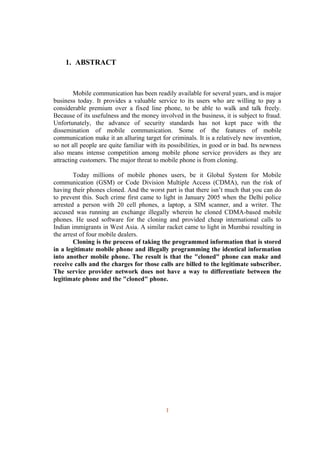Mobile cloning report
- 1. 1. ABSTRACT Mobile communication has been readily available for several years, and is major business today. It provides a valuable service to its users who are willing to pay a considerable premium over a fixed line phone, to be able to walk and talk freely. Because of its usefulness and the money involved in the business, it is subject to fraud. Unfortunately, the advance of security standards has not kept pace with the dissemination of mobile communication. Some of the features of mobile communication make it an alluring target for criminals. It is a relatively new invention, so not all people are quite familiar with its possibilities, in good or in bad. Its newness also means intense competition among mobile phone service providers as they are attracting customers. The major threat to mobile phone is from cloning. Today millions of mobile phones users, be it Global System for Mobile communication (GSM) or Code Division Multiple Access (CDMA), run the risk of having their phones cloned. And the worst part is that there isn’t much that you can do to prevent this. Such crime first came to light in January 2005 when the Delhi police arrested a person with 20 cell phones, a laptop, a SIM scanner, and a writer. The accused was running an exchange illegally wherein he cloned CDMA-based mobile phones. He used software for the cloning and provided cheap international calls to Indian immigrants in West Asia. A similar racket came to light in Mumbai resulting in the arrest of four mobile dealers. Cloning is the process of taking the programmed information that is stored in a legitimate mobile phone and illegally programming the identical information into another mobile phone. The result is that the "cloned" phone can make and receive calls and the charges for those calls are billed to the legitimate subscriber. The service provider network does not have a way to differentiate between the legitimate phone and the "cloned" phone. 1

